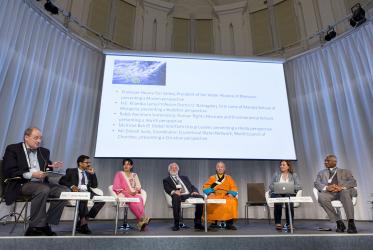Displaying 61 - 80 of 92
An interview with the Ethiopian Patriarch, Abune Matthias
14 February 2017
Nigerian Christians and Muslims open historic peace centre
20 August 2016
In Ghana, women bring open minds, honest words
05 July 2016
Religion: Way of war or path to peace?
30 June 2016
WCC conference explores ecological injustice in Uganda
21 April 2016
WCC/UN conference calls for coordinated action on refugee crisis
20 January 2016
Basel University honors Ghanian Methodist theologian
09 December 2015
WCC urges responsibility for and support to the refugees in Europe
04 September 2015














